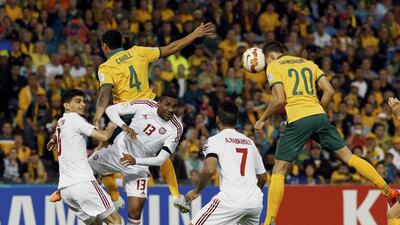It lasted 90 minutes yesterday but only the first 15 mattered.
When Mahdi Ali reviews his team’s 2-0 AFC Asian Cup semi-final loss to Australia, he can turn off the video at the point when Jason Davidson’s 14th-minute goal nestles in the back of the net.
In a sport where the first and second halves often are discussed as if they were events separated by miles and hours, this match barely changed.
Six substitutes were introduced, more kilometres were logged, but all was revealed in a disastrous first quarter hour.
• The national team’s problems with restarts in the defensive half remain unsolved.
The two crushing goals in the UAE’s tournament came on corners, in the 91st minute versus Iran and the third minute versus Australia.
The issues are related to height and execution.
Mahdi Ali’s first XI has several players who are not tall enough to make an impact where aerial battles are fought, in front of goal.
Tactically, too often a dangerous attacking player gets lost by UAE defenders.
Yesterday the Emiratis were rightfully concerned with Tim Cahill, the Australian so effective in the air, and two defenders followed him.
Trent Sainsbury was ignored and he nodded down the early header goal.
• Limit Omar Abdulrahman, and the UAE sputter.
Some teams kick him. Australia gave him some space but clogged his passing lanes; he completed only 28 of 55 passes yesterday, 52 per cent.
Listen: Podcast
He can be further marginalised if an opponent pushes forward in numbers as he is a defensive liability who often does not track back.
Sainsbury’s biting analysis of him as “lazy” resonated when Abdulrahman, only a few feet away, turned spectator to the second goal yesterday.
• UAE scoring of late comes from only two sources. They have six goals in Australia, four to Ali Mabkhout and two to Ahmed Khalil.
Australia neutralised them by closely marking Mabkhout, starving him of the ball and ignoring Khalil until he got within 25 yards of the goal. The latter is a threat, but he must receive the ball very near to where he will shoot it.
It gets worse. Including the Gulf Cup of Nations, in November, the UAE have 13 goals in 10 competitive matches. Mabkhout (nine) and Khalil (four) have scored all of them.
One solution is to encourage the midfielders who reach the area to shoot, and more and more training for the big guys on corners in the attacking end.
• Fatigue will be one of Mahdi Ali’s biggest concerns in the run-up to World Cup qualifying.
His side looked weary yesterday, understandably, given five matches in 17 days. More of this is coming.
Between February 3 and May 10, Arabian Gulf League teams will play 13 matches (14 for Al Ain).
Al Ahli and Al Ain, who between them supply 14 national team players, will play a further six Champions League matches during that stretch. Al Jazira and Al Wahda, who each supply two players, could play seven, if they win a qualifying match and enter the group phase.
Every team will play at least one President’s Cup match and as many as four.
At a minimum, Ahli will play 20 games in 97 days, Al Ain 21 and, if Jazira and Wahda qualify for the Champions League groups, it also will be 21 for them.
It will be up to the coach to manage player fatigue – it will be a key factor.
poberjuerge@thenational.ae
Follow us on Twitter at SprtNationalUAE

